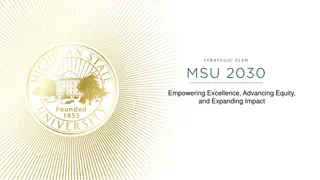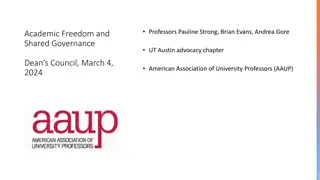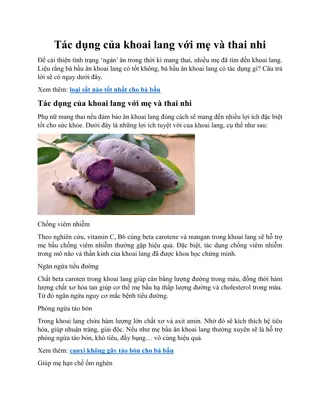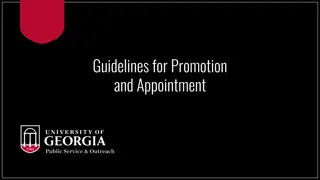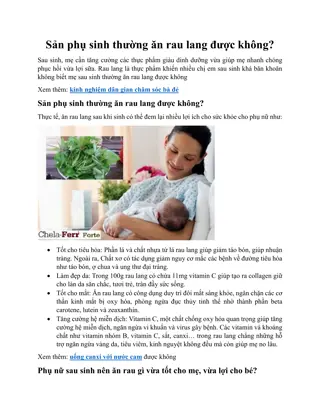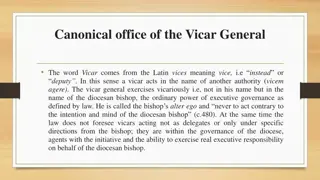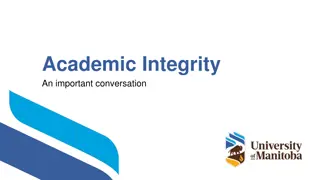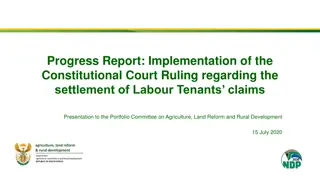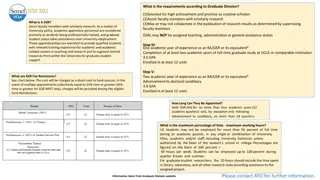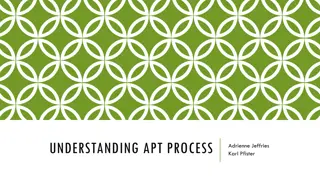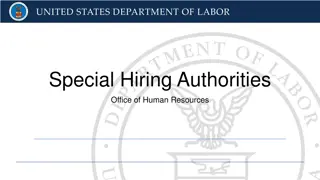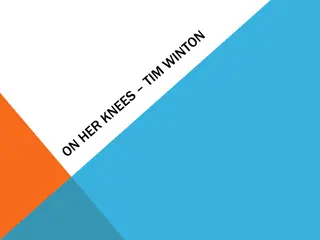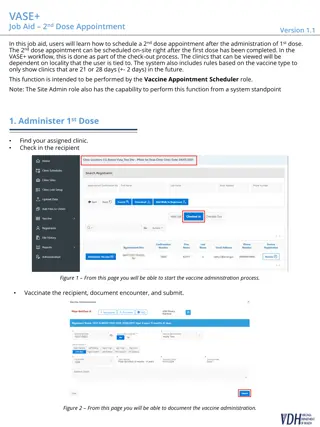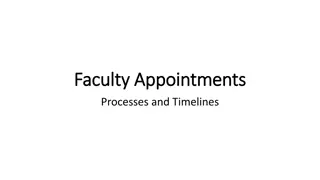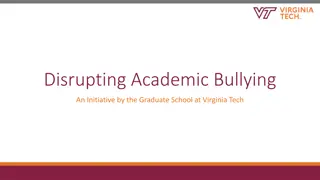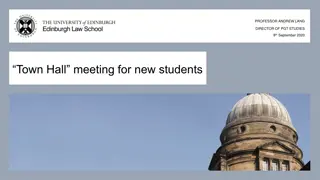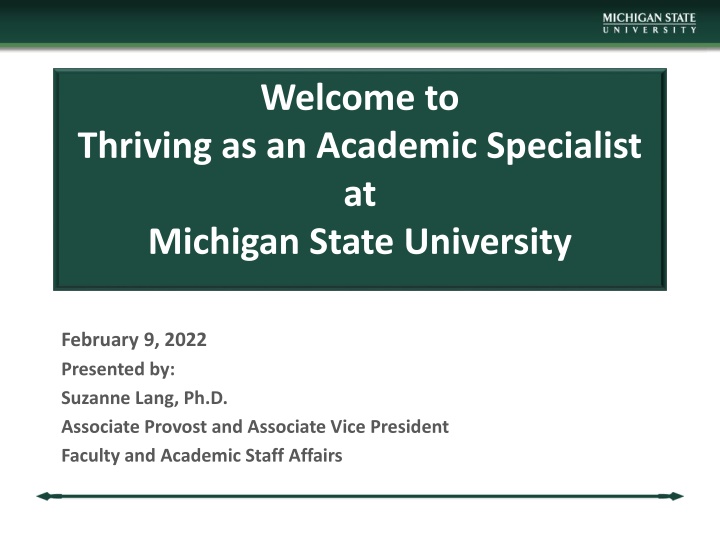
Thriving as Academic Specialist at Michigan State University
Discover the historical perspective and evolution of the Academic Specialist system at Michigan State University, including learning objectives, roles, evaluation processes, and insights from distinguished specialists. Explore the foundation, growth, and importance of Academic Specialists in the university's educational framework.
Download Presentation

Please find below an Image/Link to download the presentation.
The content on the website is provided AS IS for your information and personal use only. It may not be sold, licensed, or shared on other websites without obtaining consent from the author. If you encounter any issues during the download, it is possible that the publisher has removed the file from their server.
You are allowed to download the files provided on this website for personal or commercial use, subject to the condition that they are used lawfully. All files are the property of their respective owners.
The content on the website is provided AS IS for your information and personal use only. It may not be sold, licensed, or shared on other websites without obtaining consent from the author.
E N D
Presentation Transcript
Welcome to Thriving as an Academic Specialist at Michigan State University February 9, 2022 Presented by: Suzanne Lang, Ph.D. Associate Provost and Associate Vice President Faculty and Academic Staff Affairs
Learning Objectives Learn about the history of the Academic Specialist Appointment System Understand the various roles you play as Specialists and how your work fits into the university Gain knowledge about the evaluation process towards achievement of Continuing status Learn from other Specialists who have developed distinguished careers in the Specialist system
MSU Specialists An Historical Perspective (1 of 3) 1942 1946 1952 First rules of faculty tenure established 30% of faculty held terminal degrees Tenure rules suspended due to influx of students & faculty following the end of WWII Revised set of tenure rules implemented 45% of faculty held terminal degrees
MSU Specialists An Historical Perspective (2 of 3) 1952 - 1957 Late 1950 s 1959 Student enrollment grows from 15,500 to more than 20,000 students 67% of Instructors obtained terminal degrees SPECIALIST category established to accommodate changing needs of the university
MSU Specialists An Historical Perspective (3 of 3) 1977 Early 1980 s Late 1980 s Specialist operating procedures formalized More extensive set of policies drafted, with formal input from Specialists Continued growth in the number of Specialists across campus
MSU Specialists An Historical Perspective (continued) 1992 1993 Today The Academic Specialist Advisory Committee formed BOT approved the Academic Specialist Appointment System Policies Specialists continue to serve as an integral part of the educational framework of MSU
Academic Specialists The Basics Functional Areas Academic Advisor Teaching Curriculum Development Research Outreach Appointment Types Fixed Term Continuing System Ranks Specialist Senior Specialist
Academic Specialists at MSU 979 Specialists (as of January 2022) Continuing System 37% Continuing System Fixed-Term Fixed-Term 63%
Academic Specialists at MSU by category Specialists by Appointment Category Teacher 22% Advisor 29% Advisor Curr. Dev. Outreach Research Research 9% Teacher Curr. Dev. 8% Outreach 32%
Academic Specialists at MSU by college Number of Specialist by Unit 136 100 91 81 60 59 56 49 40 33 32 31 30 28 26 24 17 15 13 10 9 8 6 5 5 4 4 3 1 1 1 1
Establishment of a Specialist Position Academic specialist positions should be established only if this is the best way for the academic unit to function at the highest possible level of effectiveness and efficiency within available resources. Academic specialist positions are established on the recommendation of the appropriate administrator of the academic unit, the concurrence of the appropriate dean/separately reporting director, and require approval by the Office of the Provost. Individual units determine whether to establish a position as fixed term or continuing system.
Establishment of a Specialist Position (continued) Moving from a fixed term appointment to a continuing system appointment is based upon individual unit needs and resources. Done in consultation with Office for Faculty and Academic Staff Affairs (FASA) There is no pre-established number of specialist positions. Programmatic and budgetary considerations lead to the decision about continuing system versus fixed term appointment
Establishment of a Specialist Position (continued) Establishment of a specialist position begins with the Specialist Position Description Effort allocation across the functional areas may change Keep position description updated, as this serves as the basis for annual and continuing reviews.
Academic Specialists Evaluation Policy For all faculty and academic staff, MSU requires an annual evaluation. Our policy is a minimalist policy, allowing for unit customization, i.e. There is no standardized form Units determine the timeline, e.g. academic year, calendar year
Academic Specialists Evaluation Policy (continued) The academic specialist shall be evaluated by the appropriate unit administrator before the end of the applicable annual duty period for those on probationary or fixed term appointment and at appropriate intervals for those with continuing appointment status. Evaluation shall be based on the duties and responsibilities specified in the job description for the specific position, general merit guidelines and the provisions of the Academic Specialist Appointment System.
Evaluation & Impact of COVID COVID Impact statement - The purpose is to acknowledge that faculty and academic staff (FAS) at MSU have encountered varied challenges due to the pandemic. Guidelines for FAS on writing a COVID-19 impact statement that may be submitted to their unit administrator as part of their activity report for annual review, and to internal and external reviewers upon promotion/continuing appointment assessments. Prompts for considering what to include in the impact statement.
How to Use a COVID Impact Statement Broad discussions within disciplines and academic units need to be facilitated to explore how the discipline(s) has been impacted by the pandemic and what opportunities for program growth and scholarship were not possible to inform the context of how to judge accomplishments. The impact statement provided by a FAS member is accepted as valid because they are a trusted member of the scholarly community. Each impact statement is equally valued.
How to Use a COVID Impact Statement (1 of 2) Impact of the pandemic may be accelerating as well as decelerating and may change over time. Under such extraordinary times, the work that is produced can still be evaluated based on quality and relevance to increasing knowledge and understanding rather than on quantity of work. Assessments about annual reviews, reappointment, and promotion must be made on the information provided by the FAS member. While a COVID impact statement is not required, impact that is not documented cannot be considered in assessments.
How to Use a COVID Impact Statement (2 of 2) Value-based categories like sharing information, expanding opportunities of others, and mentoring/stewardship may be applied to activity reports and impact statements to allow FAS to share the multiple ways learning, teaching, and knowing have occurred to indicate how FAS have been doing valuable, adaptive, human-based work in other new and perhaps non- traditional ways.
Reappointment & Promotion Reappointment, including the award of continuing appointment status and promotion to the rank of senior academic specialist, is predicated on the: exemplary performance of assigned duties, professional development, excellence in scholarly activity, leadership and contributions to the institution.
Reappointment & Promotion (cont. 2 of 3) Form on Progress and Excellence Formally referred to as Form C Partnership between ASAC and FASA DEI as part of the evaluative process in AY 22-23 review cycle Recommendations for writing and evaluating DEI for annual review and promotion coming soon
Reappointment & Promotion (cont. 3 of 3) A unit review committee will be established to advise the unit administrator about the reappointment, award of continuing appointment status, or promotion of the academic specialist. The review committee is composed of individuals knowledgeable about the position under review and the Academic Specialist Appointment System The academic specialist under review must be provided an opportunity to confer with the review committee before it provides advice to the unit administrator regarding reappointment, promotion or award of continuing appointment status.
Continuing System Timeline During the second year a reappointment review occurs If unsuccessful, the appointment ends as originally scheduled Appointed as a Continuing System Specialist to a 3- year probationary appointment During the second year, the continuing review occurs If successful, one is reappointed with continuing status If unsuccessful, the appointment ends as originally scheduled If successfully reappointed, the Specialist begins a second 3-year probationary appointment
Continuing Review Timeline (continued) Academic Specialist notified when the evaluation is to take place Nov Review committee is established, composed of individuals knowledgeable about the position Dec - Feb Review committee makes recommendation to the appropriate academic unit administrator Feb Recommendation is reviewed and sent to the major unit administrator (i.e. Dean) Mar Dean forwards recommendation to Provost Due May 15 Reviewed by Provost with outcome notification back to unit June
For the Health Colleges CHM, COM, CON With the creation of the position of Executive Vice President for Health Sciences, and the change in the reporting relationship of the human health colleges to the EVP: Deans will make recommendations to the Provost and EVP Joint recommendation will come from Provost and EVP
Promotion to Senior Specialist The basis for promotion to Senior Academic Specialist is to be derived from a significantly long and sustained period of excellence in the performance of assigned duties together with the recognition by peers and colleagues both within the University and regionally, nationally and internationally. Based on internal/external peer review involving evaluation of performance in one or more of the assigned functional areas
Preparing for Reappointment & Promotion Diligent DOCUMENTATION is the key to preparing a successful reappointment/promotion packet Self Appraisal It s all about the STORY What story will you tell about your career?
Examples of Scholarly Achievement Authoring/Co-authoring publications (internal & external) Departmental/College level leadership Leadership in professional organizations Serving as a subject matter expert Development of new programs Presentations at national meetings Collaboration on special projects/grants
Career Strategies Benchmarking: Have a plan! Continuing Education Professional and Scholarly Organizations Academic Governance (department, college, campus) Advising of Student Groups Lilly Fellows and Adams Academy Leadership Learning Communities Mentoring Support Groups
Campus-wide opportunities Lilly Teaching Fellows Program: Open to individuals who wish to complete a Scholarship of Teaching and Learning (SoTL) project with support of $16,000 (shared between Faculty Academic Staff Development and fellow s department). Adams Academy Fellows Program: Open to individuals who wish to focus on deeper issues of teaching and learning. Outcome is a reflective digital teaching portfolio. $3,000 CfP-early spring/12 fellows are selected each year.
Important Policies Important Policies Academic Specialists Professional Development Support Program For MSU credit courses Overload Pay Time Off/Leaves Vacation - Provided for those appointed on an AN basis Short Term Disability Provides up to six months paid leave Parental Leave Provides 6 weeks of paid parental leave Distinguished Academic Staff Award
Questions? Faculty and Academic Staff Affairs Team: Suzanne Lang, Associate Provost and Associate Vice President, FASA Kathy Lewless, Director Melissa Sortman, Director Jennie Yelvington, Director Kara Yermak, Director


